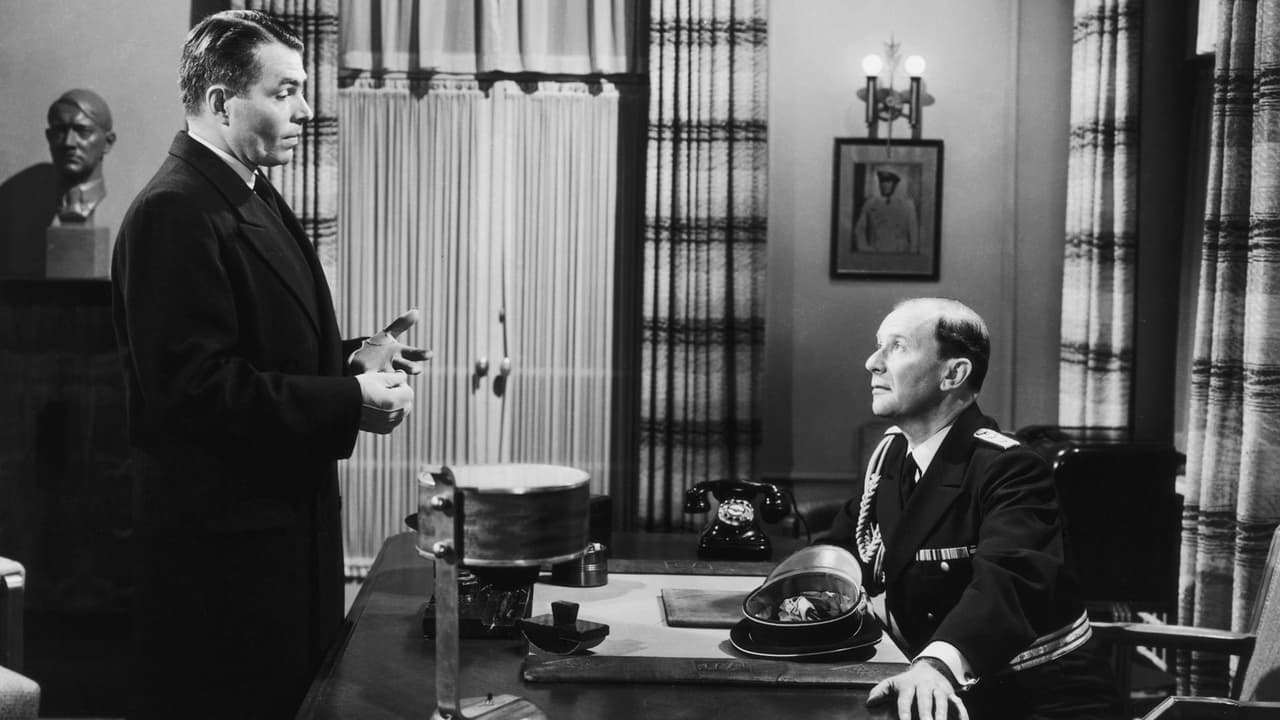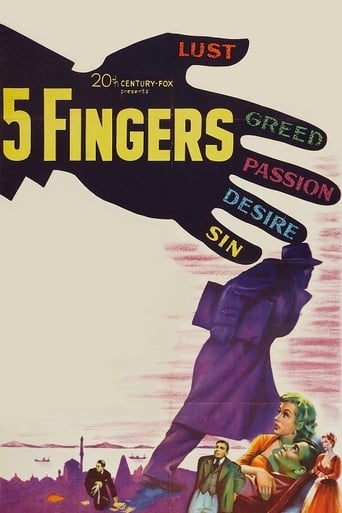

Touches You
... View MoreThat was an excellent one.
... View MorePlot so thin, it passes unnoticed.
... View MoreThe movie's not perfect, but it sticks the landing of its message. It was engaging - thrilling at times - and I personally thought it was a great time.
... View More"5 Fingers" is based on a true story about the highest paying spy caper in history. It operated through the British embassy in Ankara, Turkey, from late 1943 to early 1944. Nazi Germany obtained many highly secret documents about Allied plans. The Nazis named the project "Operation Cicero." The movie is based on a 1950 book of the same title by Ludwig Carl Moyzisch. Most of the people in the film have fictional names except for the top German embassy staff. Moyzisch was an undercover Nazi SS officer. Count Franz von Papen was the real German Ambassador to Turkey. Hollywood made two major "cast" changes for this film. It deleted Nele Kapp, who became secretary to Moyzisch in the German embassy in January 1944, and it added the fictional character of Countess Anna Staviska. The countess makes the film more tantalizing and interesting and enables a surprise ending that is very clever and satisfying. Michael Wilson wrote a masterful screenplay. He won a Golden Globe for this film and has two Oscars to his credit – for "The Bridge on the River Kwai" and "A Place in the Sun." His dialog has some of the wittiest, biting lines ever written for the screen. Some are spoofs, others satire.All of the cast shine in this superb film. Other sources give details about the plot. For those interested in more of the history and film background, here are some more details. The deleted real person from the film, Nele Kapp, was the daughter of a prominent German diplomat. She became an American agent. Moyzisch says she blew the cover of Cicero. There's quite a story about her defection and how the Americans got her out of Turkey ahead of the Nazis killing her. The story of Nele Kapp would make a good movie all by itself. She eventually made it to America, married and wound up living in California. The real Cicero, Elyesa Bazna, was quite different from the man portrayed by James Mason. Bazna was Albanian, he served in the French military, and spent time in prison for stealing. He worked at different trades, and because he could speak three languages, he was hired to work in diplomatic circles. He was a doorman, a driver and guard, and finally was hired as the British ambassador's valet. This was all without a security background check. Some of the light satire points to the laxity of British security.Bazna was married a second time, and had live-in mistresses. His original contact was different from that shown in the movie, but it involved two rolls of film in exchange for £20,000 English. That was on Oct. 26, 1943. He sold many more rolls of film, with Moyzisch his contact. After his cover was blown, Bazna stayed in Ankara. He just quit spying in late February and gave his notice. He left the embassy around April 20. In the 1950s he lived in Istanbul with his family, and then moved to Munich, Germany in 1960 where he worked as a night watchman. He died there of kidney disease in 1970. Bazna wrote a book about Operation Cicero in 1962, "I Was Cicero."Bazna was paid £300,000 (about $1.2 million U.S. then) – most of it counterfeit. He hid the money until after the war. He then tried to build a hotel with a partner. But his payment with the counterfeit money landed him in prison for a time. The Nazis had made about £300 million in counterfeit money during the war (Operation Bernhard). They used it mostly for espionage. The largest payments were for Operation Cicero and £100,000 for Benito Mussolini's rescue. Most of the counterfeit money was captured at the end of the war and destroyed. As the movie shows, the Nazis used very little of the intelligence from Cicero. They got so much, so highly classified, that many doubted it could be real. Here are some samples of biting and sardonic lines. Von Papen, "Why did you leave Warsaw?" Countess, "Bombs were falling. I felt I was in the way." Von Papen, "And why did you come here? You and your late husband had lived so long in England." Countess, "I did not consider being bombed in London more attractive than being bombed in Warsaw." Countess, "Many of our German friends before the war would come as our guests to hunt wild pig. I refused to invite Goering. I couldn't tolerate his killing a wild pig. Seemed too much like brother against brother."Moyzisch, "Cicero?" Von Papen, "The name is the personal choice of Herr Ribbentrop." Moyzisch, "Has it any significance, sir?" Von Papen, "None that I know of. Except the surprising fact that Herr Ribbentrop has even heard of Cicero."Countess, "Unfortunately, I have a dinner engagement. But he's an undersecretary and used to waiting." Diello, "Any particular undersecretary, madam?" Countess, "Undersecretaries are never particular. Perhaps that's why they take me to dinner." Diello, "It's far more likely that in madam's presence they feel like ambassadors."Von Papen, "Half-witted, paranoid gangsters. Moyzisch, it's time you understand – we represent a government of juvenile delinquents." Moyzisch, "Yes, sir."Travers, "I'm probably just a gossip at that. Maybe that's why I like my work. Counter espionage is the highest form of gossip."Countess, "Do you have a nationality, Diello?" Diello, "Most people are born somewhere." Countess, "You're not a native Englishman. What are you?" Diello, "Albanian English by adoption." Countess, "You're the only Albanian I've ever known." Diello, "You know one, you know them all." Moyzisch, "We would prefer that you come to the German consul at the same hour if you like." Diello, "No, thank you, although I'm tempted. So many more people go into German consulates than come out. I've often wondered what possible attraction would keep them there so long."
... View MoreDuring the late 1940s and into the 1950s, Joseph Mankiewicz was probably the most successful man in Hollywood--directing and writing such amazing films as "A Letter to Three Wives", "All About Eve" and "House of Strangers". However, by the time he made "Five Fingers", Mankiewicz was at the end of his contract with Twentieth Century- Fox--and it sure was an excellent farewell.This movie is based on real events, though a few changes were made for cinematic purposes. James Mason plays a valet in the British embassy in Turkey during WWII and he's a completely trusted but totally amoral man. To earn money for his retirement, the guy approaches the Nazis and offers to sell them secrets. What is most interesting about this movie is that you see just how stupid the Nazis and the Brits. Despite repeatedly giving them excellent information, again and again the Nazis didn't trust it and didn't take advantage of it. As for the Brits, you wouldn't think that they'd let an Albanian valet to have such access to secrets! Still, it's a very fascinating story--one that is well made and well worth your time.
... View MoreThe film opens in 1944 at an embassy affair in neutral Turkey. The German ambassador, von Papen, slips out of the ballroom where the soprano is carrying on about the ride of the Valkyries, remarking, "Wagner makes me sick," and chats with Danielle Darrieux, a wealthy French countess who has been chased from France to Poland to England by falling bombs. She pleads with von Papen for money. She'll do anything to regain her estate and its treasures. She can be very beguiling. She can be a spy. Von Papen excuses himself politely and leaves. Another guest is standing nearby, eyeballing Darrieux. She sneers a little and tells him, "Please, don't stand there staring at me as if you were worth more than your salary." Good old, literate Joseph Mankiewitz, the writer and director who gave us "Fasten your seat belts. It's going to be a bumpy ride." Most of the good lines are given to James Mason as the British Ambassador's valet in Ankara. Valets, like most servants, are given what the sociologist Erving Goffman called "non-person treatment." They're regarded as items of convenience of pieces of furniture, and they know enough to keep family secrets. Mason, as "Cicero", his code name in German Intelligence, knows enough to keep family secrets too. He also knows enough to get the combination to the embassy's safe, remove valuable documents, photograph them, and sell them to German agents, no matter how dubious those German agents might be. They continue to suspect that he's a British double agent and they fail to act on his information, even the time and place of the D-Day landings on Normandy.There are several double crosses, which I won't describe in detail. When Mason has all the money he thinks he needs to live like a gentleman in Rio de Janeiro with his former employer, Darrieux, as his mistress, she runs off to Switzerland with all the dough. And when Mason finally reaches Rio and stands on his veranda in the evening breeze, drinking high-falutin' wine, an incident takes place that I don't believe because I think it may have been ripped off from "The Lavender Hill Mob." In the end it's a tale of morality. The moral is: Make sure you pay your charwoman enough so that she doesn't take a Minox camera to the material you've stashed in the family vault.
... View MoreSupposedly based on a true story, a valet uses his position at British embassy to steal WWII secrets to sell to the Germans.What a superbly tight script that stays on the compelling track the whole time. We watch lowly valet Diello (Mason) use nothing but wits and guts to outmaneuver both the British and the Germans. He's not a sympathetic lead character, always unusual for a Hollywood production (TCF). But you can't help admiring his ability to outwit the professionals, even if he is completely self-centered. I get the feeling Diello sees himself as a natural born aristocrat denied that position by the fortunes of birth. So, by golly, he's going to use those talents to get the wealth and position he deserves, but which European society has denied him.Mason is simply superb in a tailor-made part. He projects both the icy intelligence and curt politeness that the role requires. I sweated a bucket load when the cleaning lady rummages around the closet, while Diello photographs embassy secrets. If she finds the power switch, he's toast. Great scene. Note too, how there're no obvious good guys-bad guys, also unusual for a WWII drama. The British are slightly favored, but at least the Germans aren't caricatured. It's more like one opportunist (Diello) is exploiting both sides impartially, and they're both after him.Then too, what guy wouldn't lose his head over the delectable Darrieux, even a guy as calculating as Diello. All of which makes the ending one of the most ironically satisfying in movie annals. I'm betting this was one of the best films to come out of that spare movie year of 1952. So if you haven't seen it, do.
... View More